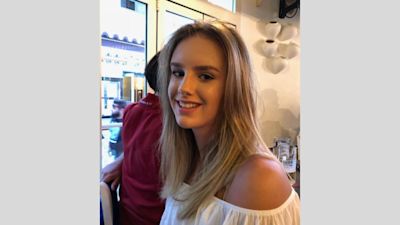Call for ban on acne drug Roaccutane after suicide of North Yorkshire teen

Video report by Jon Hill
A mother from North Yorkshire has made an emotional plea for an acne drug to be banned for under-21s after her teenage daughter took her own life.
Annabel Wright, from Ripon, had been prescribed the drug Roaccutane before she died in May 2019, aged 15.
Last month a coroner found no link between her death and the medication, but her parents believe that the drug, which can cause depression, drove her to suicide.
Annabel's mother, Helen, said: "I talk to her all the time and I tell her how sorry I am.
"I feel that I failed her. It's my job to protect her and I allowed doctors to give her a pill she didn't need and it caused her death, that's how I feel.
"I know she wouldn't blame me for it, I know she wouldn't because that was the way she was, but I'll take the guilt with me."
What is Roaccutane?
The brand name for isotretinoin, Roaccutane is a medication primarily used to treat severe acne.
It is also used to prevent certain skin cancers.
The most common adverse effects are dry lips, dry and fragile skin, and an increased susceptibility to sunburn.
Uncommon side effects include muscle aches and pains and headaches. It is also associated with psychiatric side effects, most commonly depression but also, more rarely, psychosis and unusual behaviours.
Mrs Wright said she had been in touch with other families who have lost children to suicide after taking the drug and is now calling for the medical watchdog - the MHRA - to review its use for young people.
She said: "Having looked further into it, I've heard so many stories of people who say they've had this feeling.
"Doctors are telling people to look out for low mood and depression but it's not it's more of a disconnection at best but these waves of suicidal ideation are just for some people overwhelming."
The drug carries warnings of side effects including moodiness, which in rare cases have led to suicide and attempted suicide.
But at Annabel's inquest the coroner said evidence from experts revealed no "settled and agreed view" of any link between the drug and self-harm, and the decision to prescribe it to Annabel was reasonable.
What does Roaccutane's manufacturer say?
Roche, which makes Roaccutane, says it recommends that the drug is prescribed carefully, particularly if the patient has a history of depression.
A company spokesman said: "We take the safety of all our medicines very seriously.
"Millions of patients worldwide have taken RoAccutane, but like most medications, it can have side effects.
"That is why we recommend it is prescribed very carefully, with particular consideration regarding any previous history of depression."
What does the regulator say?
The Medicines and Healthcare Products Regulatory Agency (MHRS) said it carefully assesses every report of a severe reaction suspected to have been caused by a drug.
Alison Cave, chief safety officer, said: "We are conducting a very careful and comprehensive review of the available evidence on the benefits and risks of isotretinoin, which has heard the views of patients through a public consultation. We are grateful for all the valuable contributions from patients and families we have received throughout.
"In addition, we have sought the advice of experts in this area as well as the independent Commission on Human Medicines.
"We cannot yet give a specific date when the outcome of the isotretinoin review will be made available, but we will keep everyone who has been involved up-to-date."